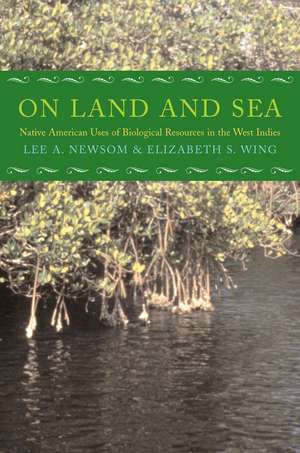On Land and Sea: Native American Uses of Biological Resources in the West Indies
Autor Dr. Lee A. Newsom, Elizabeth S. Wingen Limba Engleză Paperback – 3 mai 2004
During the vast stretches of early geologic time, the islands of the Caribbean archipelago separated from continental land masses, rose and sank many times, merged with and broke from other land masses, and then by the mid-Cenozoic period settled into the current pattern known today. By the time Native Americans arrived, the islands had developed complex, stable ecosystems. The actions these first colonists took on the landscape—timber clearing, cultivation, animal hunting and domestication, fishing and exploitation of reef species—affected fragile land and sea biotic communities in both beneficial and harmful ways.
On Land and Sea examines the condition of biosystems on Caribbean islands at the time of colonization, human interactions with those systems through time, and the current state of biological resources in the West Indies. Drawing on a massive data set collected from long-term archaeological research, the study reconstructs past lifeways on these small tropical islands. The work presents a wide range of information, including types of fuel and construction timber used by inhabitants, cooking techniques for various shellfish, availability and use of medicinal and ritual plants, the effects on native plants and animals of cultivation and domestication, and diet and nutrition of native populations.
The islands of the Caribbean basin continue to be actively excavated and studied in the quest to understand the earliest human inhabitants of the New World. This comprehensive work will ground current and future studies and will be valuable to archaeologists, anthropologists, botanists, ecologists, Caribbeanists, Latin American historians, and anyone studying similar island environments.
On Land and Sea examines the condition of biosystems on Caribbean islands at the time of colonization, human interactions with those systems through time, and the current state of biological resources in the West Indies. Drawing on a massive data set collected from long-term archaeological research, the study reconstructs past lifeways on these small tropical islands. The work presents a wide range of information, including types of fuel and construction timber used by inhabitants, cooking techniques for various shellfish, availability and use of medicinal and ritual plants, the effects on native plants and animals of cultivation and domestication, and diet and nutrition of native populations.
The islands of the Caribbean basin continue to be actively excavated and studied in the quest to understand the earliest human inhabitants of the New World. This comprehensive work will ground current and future studies and will be valuable to archaeologists, anthropologists, botanists, ecologists, Caribbeanists, Latin American historians, and anyone studying similar island environments.
Preț: 197.48 lei
Nou
Puncte Express: 296
Preț estimativ în valută:
37.79€ • 39.55$ • 31.45£
37.79€ • 39.55$ • 31.45£
Carte indisponibilă temporar
Doresc să fiu notificat când acest titlu va fi disponibil:
Se trimite...
Preluare comenzi: 021 569.72.76
Specificații
ISBN-13: 9780817313159
ISBN-10: 081731315X
Pagini: 344
Ilustrații: 20
Dimensiuni: 156 x 235 x 38 mm
Greutate: 0.45 kg
Ediția:New.
Editura: University Of Alabama Press
Colecția University Alabama Press
ISBN-10: 081731315X
Pagini: 344
Ilustrații: 20
Dimensiuni: 156 x 235 x 38 mm
Greutate: 0.45 kg
Ediția:New.
Editura: University Of Alabama Press
Colecția University Alabama Press
Notă biografică
Lee A. Newsom is an Associate Professor of Anthropology at Pennsylvania State University. Elizabeth S. Wing is a Curator Emerita at the Florida Museum of Natural History and coauthor of Zooarchaeology.
Recenzii
"Newsom and Wing know the Caribbean ethnobiological data extremely well, having conducted most of the relevant research themselves. . . . Insights include subsistence change from Archaic to later time periods, dynamics of early home gardening and agricultural systems, impact of introduced species, consequences of intensified food production, and degree of over-exploitation of marine resources." —Gayle J. Fritz, Washington University
"This valuable book synthesizes current archaeological information about the plants and animals, wild and domestic, that the Native Americans of the Caribbean Basin used. Their diverse uses included food, medicine, fuel, pigments, trade, ritual, and the fabrication of built environment, art, and other aspects of material culture. . . . Recommended." —CHOICE
Descriere
Provides a storehouse of information on the human ecology of the Caribbean and illuminates the processes of colonization of island systems anywhere in the world.
